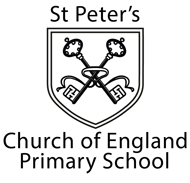Pupil Premium
St Peter’s Pupil Premium Strategy 2024-2025
Context:
St Peter’s is a large primary school with approximately 630 pupils currently attending. The number of children entitled to pupil premium in school is currently 5.8%.
We are an inclusive and caring church school with a strong Christian ethos and, at St Peter's Primary School, our Pupil Premium strategy is rooted in the belief that every child deserves a warm, supportive, and safe learning environment where they feel valued, respected, and inspired to succeed. We aim to make school a place where children want to be - a community that fosters belonging, nurtures aspiration, and empowers every child to thrive both academically and emotionally.
Our strategy prioritises targeted support for our priority pupils, ensuring that their unique needs are met across all aspects of school life. This includes closing gaps in academic attainment, fostering emotional well-being, and nurturing an aspirational sense of self. We recognise that these areas are interconnected and that success is built on a foundation of emotional security and self-belief.
To achieve this, we are committed to ensuring that every child has access to expert teachers who deliver an excellent curriculum. This curriculum is designed to be inclusive, carefully crafted to support and embed children’s understanding, and enriched with opportunities to develop critical skills and knowledge. Alongside academic rigour, our approach emphasises the importance of nurturing respectful, resilient, and emotionally regulated individuals who embody the values of St Peter's citizenship.
Through a culture of high expectations and tailored support, we aim to empower our children to overcome barriers, build confidence, and embrace opportunities. By working closely with families, utilising evidence-based practices, and fostering a whole-school ethos of care and excellence, we ensure that all pupils, regardless of their starting points, have the tools and encouragement to achieve their full potential.
At St Peter’s, we are informed by the EEF ‘menu of approaches’ to ensure that our approach to supporting priority learners is rooted in evidence and best practice.
Please see below, our pupil premium strategy statement, which conveys and includes:
- Our unwavering ambition for all our priority pupils;
- Full details of our strategy;
- Robust evidence informed research that underpins our strategies;
- The intended outcomes of our strategy.


